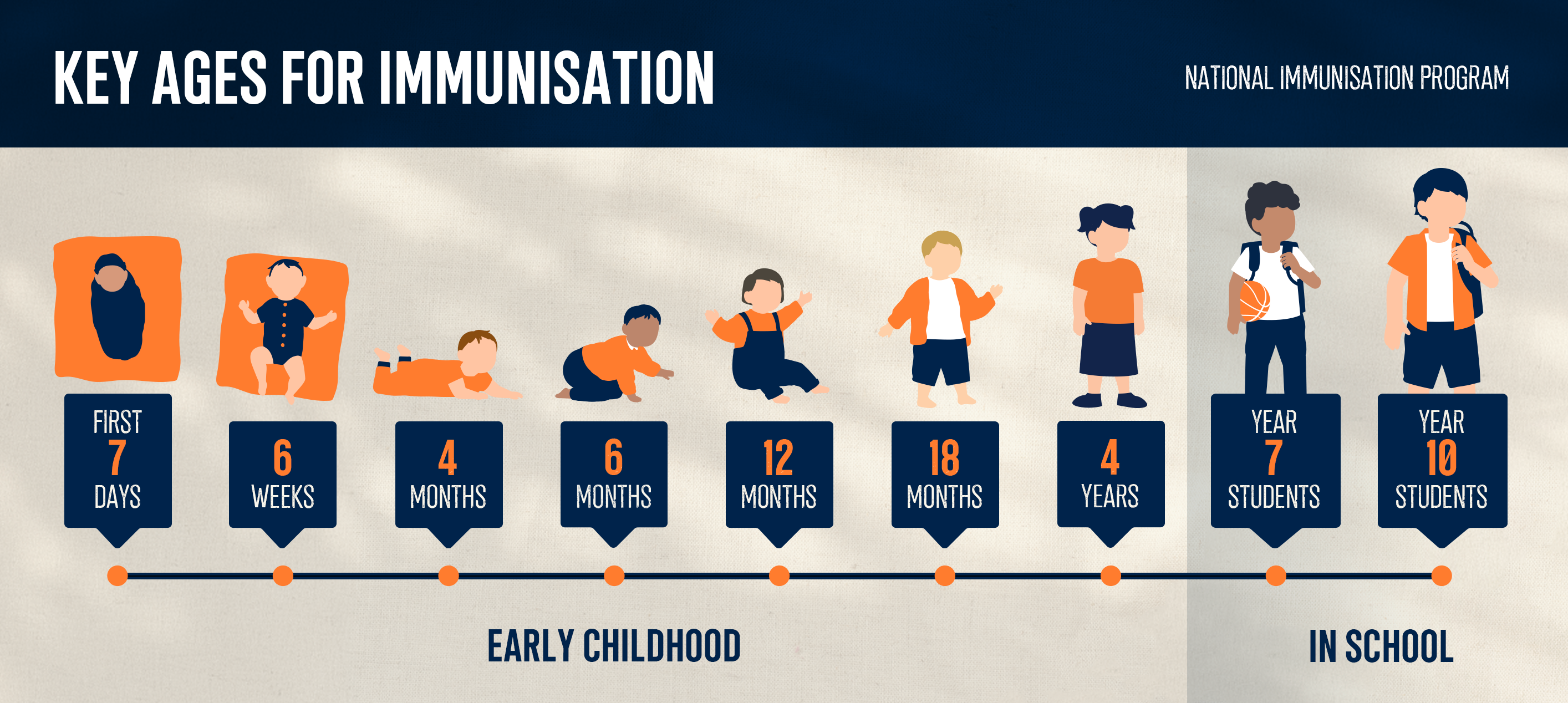

The National Immunisation Program (NIP) Schedule is a series of immunisations given at specific times throughout your life. The immunisations range from infancy through to adulthood.
To get the best possible protection, make sure you have your immunisations on time, every time.
During the first few years of your child’s life, they will need several vaccinations to protect them against serious infection and disease.
Without these vaccinations, newborn babies and young children can suffer severe complications from diseases that vaccines can prevent, such as hearing loss, limb amputation and brain damage. Some vaccine preventable diseases can lead to hospitalisation, even death.
To learn more about which vaccines your child should have and why, please visit the Sharing Knowledge About Immunisation (SKAI) website.
The childhood immunisation schedule outlines the recommended vaccines for your child from birth to 4 years old. Getting your child immunised according to the schedule timing will give them the best protection against infectious diseases. Infant and children’s immunisations must be up to date to enrol in childcare services, pre-kindergarten and kindergarten in WA.
If your child misses their vaccines at any age, they can be caught up - speak to your immunisation provider.
For more information, visit the WA childhood immunisation schedule below.

The school-based immunisation program is free at school for students in Year 7 and Year 10. If your child misses their vaccine at school, visit your immunisation provider (the vaccine is free, but consultation fees may apply).
During the term you can contact your child’s school to find out when the program will be delivered.
Year 7 students are offered human papillomavirus (HPV), and Diphtheria-Tetanus-Pertussis (dTpa) vaccine. Year 10 students are offered Meningococcal ACWY (Men ACWY) vaccine.
Catch up immunisations are available for young people up to 20 years old (26 years old for HPV ) who missed out on their vaccinations when they were first eligible.
For more information on adolescent immunisations, visit the adolescent immunisation program below.
There are many different circumstances in which adults might be recommended additional vaccines. The vaccines within the adult immunisation schedule are free for certain people through state-funded immunisation programs and the National Immunisation Program (NIP).
The immunisation program offers free vaccines for eligible individuals with specified schedules for pregnant women, the Aboriginal community, adults born after 1965, adults 65-years-old and over, and those aged 70 years old and over, as well as vulnerable people who are medically at risk.
For more information on adult immunisations, visit the adult immunisation schedule below.
When planning a pregnancy, it is important to have your routine vaccinations up to date before you become pregnant, including the measles vaccination.
While you are pregnant you should get immunised for influenza (flu) and whooping cough (pertussis). Even healthy women with an uncomplicated pregnancy can develop life-threatening influenza that can lead to premature labour or stillbirth.
Babies under 6 months are more likely to be hospitalised with influenza than any other age group. These babies are too young to get the influenza vaccine themselves, but you can protect your baby by receiving the influenza vaccine during pregnancy.
For the most up-to-date information on pregnancy immunisation, visit the link below.
Before travelling abroad you should check the SmartTraveller website for risks of infectious diseases, or see your doctor to ensure you and your children are up to date with the recommended vaccination schedule.
Travellers are reminded that measles is common in many countries outside Australia. It is a highly contagious and potentially fatal illness in many holiday destinations where there are currently a number of measles outbreaks.
The Australian Immunisation Register (AIR) is a national register that records immunisations given to people of all ages in Australia.
If you’d like to find a record of your immunisation records, you can access a record of immunisations for yourself or your child at any given time.
Find an immunisation provider near you.